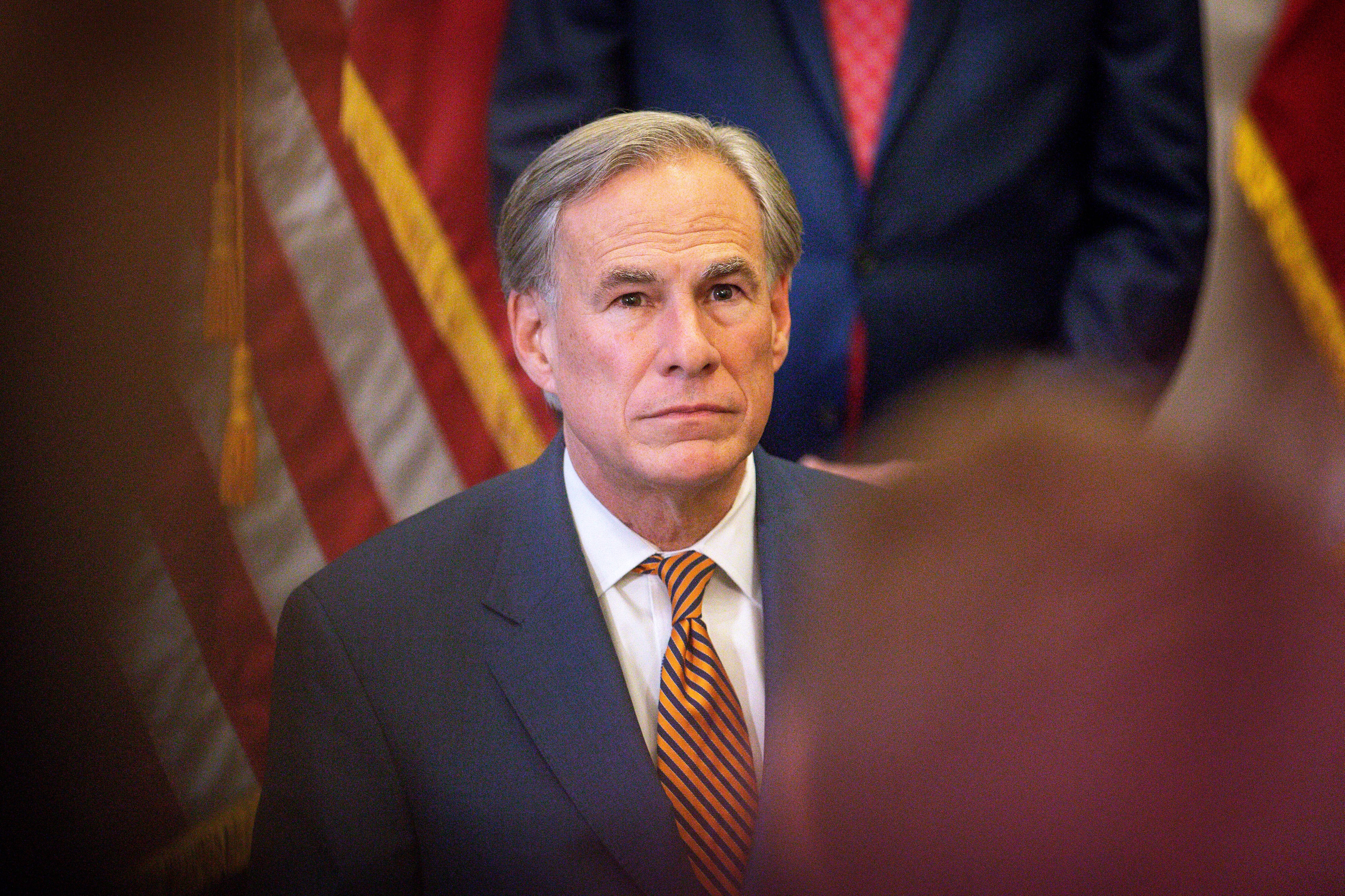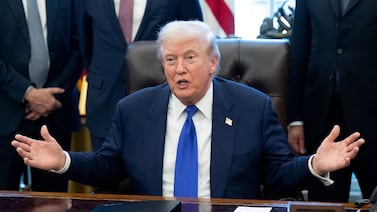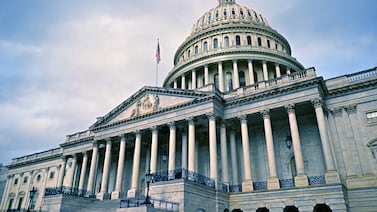A version of this post was originally distributed in Votebeat’s weekly newsletter. Sign up here.
You might remember that Texas announced last week that it would conduct a “forensic audit” of four counties — the two largest Democratic counties (Harris and Dallas) and the two largest Republican counties (Tarrant and Collin). The news came the same day former President Trump called on Gov. Greg Abbott to back new audits through the Legislature. Texas is conducting this review, however, under the secretary of state’s existing authority, and there is no sign Abbott will ask for legislation in the current special session — as Trump requested — to require an audit by law. Trump now says this was a mistake.
“By allowing the Democrats to do what they do, it will make it much harder for the Governor and other Republicans to win election in 2022 and into the future,” Trump told the Texas Tribune on Wednesday. “Texas is a much redder state than anyone knows, but this is the way to make sure it turns blue.”
The audit underway in Texas is hardly a “full forensic audit,” to the extent that phrase even has meaning. Guidance the secretary of state’s office put out this week detailed the extent of the audits, which include looking at only the information counties are already required to retain for 22 months under federal law. It’s not really clear what makes this “forensic” — this is pretty typical stuff. The counties will check voting machines, ballots, and accompanying material in ways that are essentially customary — a far cry from the chaos in Arizona, where an unqualified, privately funded contractor’s review was not customary at all. The counties have already done much of this since November; doing it again will be neither a large lift nor, most likely, particularly expensive. Costs are still being worked out, and the SOS’s office has said it *hopes* the legislature will cover them. The Legislature is in yet another special session to deal with redistricting, and in theory the costs would be covered by a bill Republicans introduce and pass during this time. The audits themselves are moving forward, regardless of who is left with the bill, because the SOS’s office already has the authority to order them.
But the way the audits are conducted isn’t really the point, is it? These audits will achieve no more security than is already built into the system. This appears to be simply a cynical optics ploy for Abbott, who is playing off of low confidence in the state’s election system to stoke his base during what has become a brutal race for his own reelection. The opportunity to fulfill Trump’s request — if only in spirit — was a gift for Abbott, who is being primaried hard from the right by two very Trumpy candidates, even though Abbott has already landed a Trump endorsement. Abbott isn’t very popular here, and he knows it.
This won’t be a Cyber Ninjas 2.0 story, and it probably won’t result in much legal drama — this is squarely within the SOS’s authority, no subpoenas necessary, and the audit seems straightforward and on par with industry standards. It will, however, distract the four largest counties in Texas all the way into spring 2022, which is how long this process is slotted to take. I don’t need to remind you all that 2022 is a federal election year, making this a pointless distraction when election administrators have more pressing issues. They do not have unlimited resources, and two of the most limited resources are people and time. In a year when every single local and state official should be mobilizing to encourage registration, implement the new district maps, and educate voters on the multitude of new election laws during a federal election cycle, they’re also required to do Trump’s bidding.
Back Then
Texas’s secession vote in 1861 was long plagued by accusations of voter fraud and allegations that Unionists were prevented from casting ballots through intimidation and creative electioneering. In 1991, historian Dale Baum attempted to use math to see if this was true. Turns out, it probably was — at least in a few counties, where he found that Union support was not reflected in voter turnout in significant ways. He looked at support for each side, local historical turnout, and final count, finding counties where stated support was substantially different than the ultimate voting result, given historical rates of turnout. His analysis found “corroborating evidence of apathy, intimidation, or possible ‘counting out’ of unionists in extreme northeastern Texas,” such as Bowie and Cass counties, and in Cameron County in the southeast. (Counting out is essentially tossing a ballot.) There were counties, such as Bexar and Kaufman, that experienced documented acts of secessionist intimidation but whose votes appear to have been counted appropriately. It is hard to know with certainty what happened these many years later, but the numbers Baum explores suggest that not all was above board. Funny how “audits” based on math actually uncover evidence of wrongdoing, huh?
In Other Voting News
- Senate Republicans in Pennsylvania are continuing their election probe, despite the failure of the Arizona review to turn up … anything. In the House, Republicans are continuing to mull a variety of other voting changes they hope to enact via a proposed constitutional amendment.
- The far-right website Gateway Pundit released a doctored version of Cyber Ninjas’ Arizona report. I know — knock me over with a feather. The false version called for the election to be decertified, a recommendation that Cyber Ninjas CEO Doug Logan says he never made. Meanwhile, if you are looking for a good fact-based explainer on everything Logan’s actual report got wrong, we can’t find a better one than over at the AP.
- The Republican National Committee is suing two towns in Vermont — Montpelier and Winooski — which voted to allow legal resident noncitizens to vote in municipal elections. The RNC called the move “radical” and an attack on elections, which should be decided “solely by American citizens.” As I’ve written in this newsletter before, noncitizens voted in the United States into the 1920s. Arkansas was the last state to ban the practice in 1926. No part of the U.S. Constitution restricts voting to only citizens.
- Wisconsin Gov. Tony Evers said this week that if he were a clerk he’d get “lawyered up,” to protect himself against claims of election rigging. It’s not a comforting thing for election officials to hear, given that they are already bailing on their jobs in frighteningly high numbers.
- New Jersey’s elections officials are preparing to implement early in-person voting for the first time on brand new technology, all while experiencing a massive worker shortage. Oh, and by the way, the pandemic is still happening. NJ.com has a great rundown on the uphill battle local officials face as state elections approach.
- Vox has a fascinating explainer on the intersection between the religious right and the push for suppressive voting legislation.
- Navajo voting rights advocate and Arizona resident Agnes Laughter has died, she was 89. She was part of a 2004 lawsuit that led to the Department of Justice expanding the types of IDs that can serve as tribal identification at the polls nationwide. Laughter was also a renowned weaver. “Future generations will remember her as a protector of our right to vote and the beautiful Navajo rugs she created. The Navajo people are grateful for her courage,” tribal council Speaker Seth Damon said in a statement.
Just Listen
Please keep sending in your hobbyist submissions for me to feature in this space, but meanwhile we’ve got three podcast recommendations for ya:
- Tyler Dukes, a fantastic journalist for the News & Observer in North Carolina, has released a podcast on redistricting in the Tar Heel State. It’s very good.
- On The Media has a full episode out on election manipulation, misinformation, and more.
- And The Daily is out with an episode on redistricting in New York. And isn’t that always a good time?






